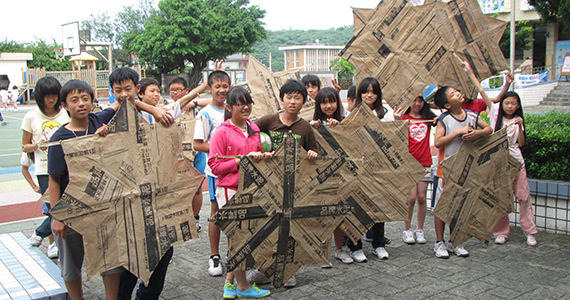Getting creative with science in rural Taiwan

Students show off their construction skills by making kites out of newspapers during classes supported by the science education program.
By Pauline Leung, a member of the Rotary Club of Taipei Pei An, Taiwan, and past governor of District 3520
On a rainy day in Spring four years ago, I was talking to a few young teachers about the education system in Taiwan. The country was on the verge of extending free education to children through the age of 12, which I thought was a good policy to reduce illiteracy.
However, the teachers had concerns about the impact of the policy on schools in remote areas of Taiwan that have less resources and thereby have a harder time staying competitive. They explained to me that the children in these schools don’t get the extra curriculum trainings necessary to have opportunities to attend college or university.
In January 2014, a report titled “Child Welfare League Foundation” noted a considerable gap between urban and rural areas. The lack of resources in remote areas led to poorer performance by children, many of who were aborigines. Since these children could never catch up, roughly a quarter of them consider dropping out of elementary school. Improving basic education seemed to be extremely crucial in helping eliminate poverty in these areas.
We started to discuss what we as Rotarians could do to help. Our team of professional educators decided we should improve their understanding of basic science, their weakest area, and make it more interesting for them. It was important to do this during their elementary school years, so that they could continue on to senior school and pursue university studies.
In our research, we learned that the National Science Council of Taiwan was cooperating with the Zhong Hwa Institute of Creative Education, to use creative tools for science training which not only increased the learner’s creativity, but also made science lessons more interesting and practical. This was exactly what we needed.
To make our project sustainable, we will provide teachers specialized in this creative science approach not only to teach fourth through sixth graders, but also train the local teachers in order that they can carry on the training for future classes.
The Rotary Club of Taipei Pei An applied for a global grant in 2013. A few other Rotary clubs also joined as well as a district in Korea.
The big smiles on the children’s faces the first time we watched them get excited about learning and use their own hands to explore basic theories of science like simple machines, levers, wheels, axles, gears, pulleys, and energy confirmed that we were doing the right thing. We told ourselves this was just the beginning.
In three years, we used Rotary Foundation funds to reach 20 schools. This year, we are entering into our fourth year and reaching more schools. Thanks to District 3600 and 3700 who used their DDF to become our international partner these past three years, we have been able to carry on a great service program, and believe we will be able to help more remote schools and children into the future.
We are convinced that our contributions to The Rotary Foundation are certainly doing good in the world and serving future generation.